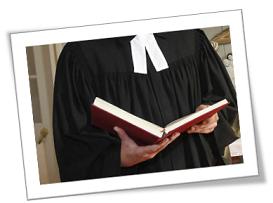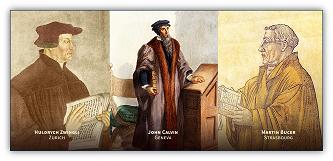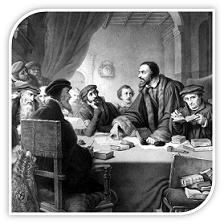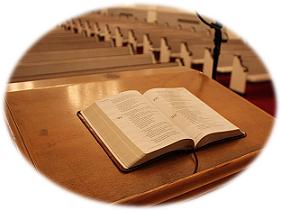The Institution of Eldership and Its Task
The Institution of Eldership and Its Task
In speaking about "Reformation and Eldership" we have to be cautious and discerning. Let's begin with the Lutheran persuasion and its ecclesiastical structure. Initially, the office of eldership did not exist in Luther's church. When it originated later, it had but a relatively small significance. In 1517, when Luther posted his Theses against the traffic of indulgences, he did not have an elaborate scheme to reform the church. He was careful and wanted to avoid even the appearance of a schism in the visible church.
For Luther, personal assurance of salvation was essential and ecclesiastical organization was of secondary importance. The visible church had significance only if she offered sound administration of Word and Sacrament. He was very industrious concerning worship services in the local congregations, but not so for their organization.
The proper ecclesiastical office in the congregation was, for Luther, the ministry. Based upon the general priesthood of the believer, the local church has the privilege of choosing its own pastors. It has a right to hear the sound preaching of the Gospel, and it was to expel ungodly preachers, and to call pious ones.
The pastors determined the form of religion. After the peasant uprising, the threat of an appalling decadence of churches, of schools and of the people was heard. At that time, to put church affairs in order, Luther enlisted the help of the Elector of Saxony.
What caused Luther to resort to this? The burden of caring for church properties; the support of the ministers; disagreement in, and the increasing arbitrariness concerning, liturgical matters; the untenable situation of the congregations; and the ignorance of the rising generation. This call for the assistance of the civil government was in fact against Luther's principles. His opinion was that believers must arrange their own meetings for preaching, their own methods of exercising benevolence and discipline. But Luther said: "To perform this, I do not have the necessary staff!"
Consequently, the government took the reins of the church and instituted consistories which consisted of theologians and jurists.
 To exercise discipline, Luther initially wanted some elders. There had been some here and there, but when the county-nobility and landowners began to act as "bishops" (office bearers obtaining leadership in the church), it was too late for Luther to install elders.
To exercise discipline, Luther initially wanted some elders. There had been some here and there, but when the county-nobility and landowners began to act as "bishops" (office bearers obtaining leadership in the church), it was too late for Luther to install elders.
It was not until the nineteenth century that the Lutheran Church had a certain form of presbyterian organization. Institution of elders began in 1846, although with limited service. In exercising his office, in doctrine, in pastoral care and in the administration of the Sacraments, a minister stood independent of the eldership. The eldership at that time was only concerned with looking after the economic issues of the congregation. The overseeing of members and exercising of church discipline by the elders remained very insignificant. The preaching of God's Word, and the administration of the Sacraments was placed upon the "Pfarrer" (the minister). In case he was hindered from performing his office, the superintendent would appoint another "Pfarrer" from a neighboring congregation to perform the necessary services. In case of a prolonged impediment he would be replaced by a Vicar, who then was personally responsible to conduct the duties of his office.
During the Reformation of Zurich by Zwingli, the government of Switzerland ruled over everything in the church. Zwingli wanted the organized local churches to have their own ecclesiastical responsibilities. But he didn't dare to have the rule of the church and the execution of discipline be entirely free from the government. Eventually, the government received total power to rule over everything in the church, the only exception being the ministerial office, which remained under the rule of the congregation.
When Bullinger (1504-1575) succeeded Zwingli, he concurred with Zwingli in some respects. He esteemed it appropriate to leave the ecclesiastical disciplinary actions to the civil government, if only the church would be allowed to keep her freedom and independence in the proclamation of God's Word. He also allowed that supervision of the church properties be the responsibility of the government. Zurich's church order ascertained that the civil government would assume ecclesiastical rule on behalf of the congregation. Not a word is mentioned concerning eldership in that church order.
In sum, when we consider "Reformation and Eldership," we can find nothing in Luther or Zwingli. We have to proceed cautiously concerning this subject. To consider eldership and the Reformation, we must visit Geneva and its great Reformer, John Calvin.
Calvin was the last of the great Reformers. He absorbed and meditated over all that had been said by Luther, Melanchthon, Zwingli, Bucer, and Farel. From the very beginning, Calvin was in agreement with Luther, especially concerning Luther's doctrine of free grace, and his view of the visible and invisible church – essentially invisible, but also externally, a visible body in which God's Word must be preached and the Sacraments administered.
More than Luther, Calvin had an eye for what the church, concerning her external appearance, must be; namely, that besides the confession of true faith there always must be a holy conduct of life. In this, Calvin displayed Bucer's influence, the theologian of Strassburg.
During his banishment from Geneva (1538-1541), Calvin resided in Strassburg. He formed close ties with Bucer and learned much from him. Still, Calvin's originality didn't suffer under this. In 1536, when Calvin arrived in Geneva, he kept himself in the background, behind Farel, but before long he came to the foreground. He became the great leader of the Reformation because of his eminent personality. Notwithstanding great opposition, which he experienced after his recall to Geneva, he dedicated himself again to promoting a visible, sanctified promulgation of the church. Calvin amended Luther's and Zwingli's doctrine of the government's power in the church, for all power in the church belongs to Christ, He being the Head of His Church and exercising His power through the offices.
In 1541, after his return to Geneva, Calvin framed a new church order and after making some changes, the city's government approved it. By means of instituting the offices and the establishing of discipline this became "Ordonnances Ecclesiastiques," the order of the church.
Calvin instituted four offices: pastors as preachers, doctors to train prospective ministers, elders to lead and rule the congregation, and deacons to care for the poor and sick.
Calvin instituted the eldership as a separate office. Concerning this, it is rightly observed that he undermined the Roman Catholic Church in doing this. Discipline matters from that time on were dealt with in the meetings, between ministers and elders. Laymen became elders, and Calvin practically allowed them to perform their duties independently – with some limits, it is true, for Calvin did not have as much freedom as he wished in Geneva.
In his "Ordonnances Ecclesiastiques" Calvin describes the eldership as follows: "They have to watch the conduct of life of all members; they have to admonish in a friendly manner all who fall into sin, or live disorderly, and when necessary, report them to the consistory which is appointed to reprimand such ones."
Luther's reformation inaugurated the sound preaching of God's Word. Calvin paid more attention than Luther to reforming church life and the individual lives of the members. There had to be church discipline in accordance with gospel preaching, and that is the reason that the offices of ministers and elders were necessary.
Upon his death-bed (1564), Calvin said that when he arrived in Geneva (1536), the gospel was preached but the people still served their idols. It is not enough to be justified only by the acquittal granted by God the Father, based upon Christ's blood, but ongoing sanctification is also necessary. This doesn't only apply to the individual believer, but also to the visible revelation of Christ's church.
This was Calvin's strong principle in his Reformation. His concept of the eldership became a very important matter. Calvin regarded the elders, as well as the ministers of the Word, as overseers (Inst. 4,3,8).
In his Care for the Congregation, Dr. C. Trimp writes:
Does Calvin's Reformation mean that every elder, who feels a compulsion to the office, simply has the right to preach? That is an incorrect and an unhistorical conclusion! For the building up of the congregation, it is very important to assess the eldership in the right way. We have to honor the 'supervisor' as the shepherd who oversees the flock of God's beloved Son. The 'overseer' labors with the Word in this task. He not only preaches God's Word publicly, but spends much of his time among the families, devoting himself to the care of individual souls. In this century, the power of the Reformed churches will be found in elders who understand the true meaning of their office, and prove this in a practical way. We find it necessary to pay attention to the similarity between the work of a minister and the elder, especially in this current age with its many problems and devilish attacks against the congregation and its families.
These are words worthy for all of us to consider. Among the Reformers, Calvin has been the most sound regarding the Scriptural concept of church offices. Although he tried to introduce them into the congregation, he did not always obtain what he wanted because of impediments from Geneva's City Council. In some points, he did not bend to the will of the City Council. For instance, he couldn't prevent the City Council from appointing elders in his church, but he demanded without conceding, that they must be installed in the normal church manner.
Calvin deemed it necessary to reintroduce the service of elders, who hadn't been called to the ministry of the Word. They had to be chosen by the congregation and they had to administer discipline together with the ministers of the Word. This was nothing new, but was a reintroduction of that which had been executed already from the commencement of the Christian Church. Even then the Apostles had installed elders who did not preach the Word.
Later on, when the Roman Catholic Church and its hierarchy was more developed, these Scriptural concepts of the ancient church completely disappeared. In the Roman Catholic church, the "bishop" became the minister of the Word, the elder became the "priest" to assist him, and the congregation became totally dependent on the clergy and their only duty was to be obedient. Calvin restored the emancipation of the congregation by giving the members the right to cooperate, under the guidance of the consistory, to choose elders, deacon and ministers.
I want to point out one more thing regarding Calvin's view which was contrary to the "prophecies" which had been introduced in Zurich, in reaction against the Anabaptists by Zwingli. The Anabaptists taught that a thorough theological training for future ministers was unnecessary and unbiblical. This meant that many church members, who were led by the Spirit, would be allowed to preach just like the New Testament prophets. According to Zwingli the congregation had a right to express its opinion about preaching. He introduced in the "Grossmunster" church of Zurich, readings or lectures over a portion of God's Word. He also introduced the fact that a portion of God's Word must be preached in the German language in the presence of the congregation. It was also Zwingli's aim to train young men to become ministers and to instruct the ignorant in the Holy Scriptures. After Zwingli's example, à Lasco introduced this also in the Dutch "Refugee Congregation" in London. They delivered simple instructions for the people in the form of a discussion and review about the sermon of the previous Sunday, but also a more scientific criticism with the purpose of instructing and training young men for the ministry.
Calvin did this differently. He held meetings every Friday with ministers of Geneva and surrounding villages. In the presence of the congregation, one of the ministers read a Bible book and explained it from verse to verse. Later the ministers would meet privately to discuss the trial sermon. To stress brotherly love, they closed these meetings with a collective meal at which they were also joined by John Calvin. He was very involved in this; in fact, even a few days before his death, he was present there. Besides the "Dutch Refugee Congregation," there was also a "Belgic Refugee Congregation" in London. They accepted Calvin's concept, except that in addition to ministers, elders and members of the congregation were also allowed to address the congregation from the pulpit. These "services" were guided by the consistory, but we cannot compare them with the normal worship services on Sundays. Although these "services" were provided at other places too, they were gradually discontinued. Later on they were replaced by preliminary services (propaedeutic) to train students of theology for the administering of the Word in the future. Because of a shortage of ministers, they also developed reading services for the normal Sunday worship services. In Scotland they introduced fifteen hundred readers who read the public prayers and portions of Holy Scripture. When more ministers became available later on, they abolished these reading services. However in 1650, they were restored because they had become indispensable. They used them to substitute for the normal administration of the Word in case of need. The "Churches under the Cross" decided in Le Bouton in the Southern Netherlands (Belgium) in 1563, that in the absence of a minister, an elder must pray and read a sermon. However, a minister or the consistory must recommend which sermon to read, and he was not allowed to either make any additions to or comments upon it, nor answer any questions about it.
The first Synod of the Netherlands (Embden 1571) decided: "To provide readers, elders and deacons for such places where the Word cannot be administered, in order that the churches might still be gathered together."
This Synod maintained the concept that reading services were of a "makeshift" nature and that the normal worship service consists of the preaching of God's Word by ministers who have been examined and permitted to preach. Thus, reading services have been in existence already for more than 400 years – a long time before the great Secession of 1834…
In addition to the regular eldership, the office of pastor and minister of the Word came into being. They exercised, besides governing, also the prophetical office.  They are the ministers who serve the local congregation with the common elders. Guided by the Holy Spirit, there came a separation between the offices in which each office obtained its individual purpose and task. Preaching by the prophetical and governing office of the ministers of the Word, the governing by the office of the elders, and the charitable, beneficent office by the deacons.
They are the ministers who serve the local congregation with the common elders. Guided by the Holy Spirit, there came a separation between the offices in which each office obtained its individual purpose and task. Preaching by the prophetical and governing office of the ministers of the Word, the governing by the office of the elders, and the charitable, beneficent office by the deacons.

Add new comment